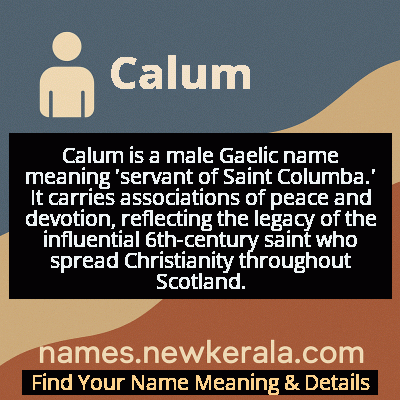Calum Name Meaning & Details
Origin, Popularity, Numerology Analysis & Name Meaning of Calum
Discover the origin, meaning, and cultural significance of the name CALUM. Delve into its historical roots and explore the lasting impact it has had on communities and traditions.
Name
Calum
Gender
Male
Origin
Gaelic
Lucky Number
5
Meaning of the Name - Calum
Calum is a male Gaelic name meaning 'servant of Saint Columba.' It carries associations of peace and devotion, reflecting the legacy of the influential 6th-century saint who spread Christianity throughout Scotland.
Calum - Complete Numerology Analysis
Your Numerology Number
Based on Pythagorean Numerology System
Ruling Planet
Mercury
Positive Nature
Adventurous, dynamic, curious, and social.
Negative Traits
Restless, impatient, inconsistent, prone to indulgence.
Lucky Colours
Green, white.
Lucky Days
Wednesday.
Lucky Stones
Emerald.
Harmony Numbers
1, 3, 9.
Best Suited Professions
Sales, marketing, travel, entertainment.
What People Like About You
Versatility, charisma, adventurous spirit.
Famous People Named Calum
Calum Hood
Musician
Bassist and backing vocalist for the Australian band 5 Seconds of Summer
Calum Best
Television Personality
Model and reality television star, son of footballer George Best
Calum MacLeod
Cricketer
Scottish international cricketer who has represented Scotland in multiple World Cups
Calum Chambers
Footballer
Professional footballer who has played for Arsenal and Aston Villa in the Premier League
Name Variations & International Equivalents
Click on blue names to explore their detailed meanings. Gray names with will be available soon.
Cultural & Historical Significance
Throughout Scottish history, the name has maintained its cultural importance, particularly in the Highlands and Islands where Gaelic traditions remain strongest. It represents a link to Scotland's early Christian period and the monastic traditions that helped shape Scottish identity. The name's enduring popularity reflects the continued reverence for Saint Columba's legacy in Scottish culture, where he is celebrated as one of the nation's patron saints alongside Saint Andrew. In modern times, the name serves as a living connection to Scotland's Gaelic heritage, particularly as efforts continue to revive and preserve the Scottish Gaelic language and traditions.
Extended Personality Analysis
Individuals named Calum are often perceived as possessing a calm, thoughtful demeanor that reflects the name's connection to the dove—a universal symbol of peace and tranquility. They tend to be diplomatic and measured in their approach to challenges, preferring harmony over conflict. This peaceful nature is balanced by a strong sense of loyalty and dedication, mirroring the devotion implied by the 'servant' aspect of the name's meaning. Calums are typically seen as reliable friends and partners who value deep, meaningful connections over superficial relationships.
Many Calums exhibit intellectual curiosity and creative tendencies, perhaps influenced by the name's association with Saint Columba's scholarly and artistic legacy. They often have a quiet confidence that doesn't need constant validation from others, and they approach life with a steady, determined attitude. While they may appear reserved initially, those who know them well appreciate their dry wit and thoughtful insights. Their combination of peacefulness and steadfastness makes them excellent mediators and trusted advisors in both personal and professional contexts, often serving as stabilizing influences in their social circles.
Modern Usage & Popularity
In contemporary times, Calum has experienced a significant resurgence in popularity, particularly in Scotland and other English-speaking countries. The name consistently ranks among the top 100 boys' names in Scotland and has gained traction in England, Wales, and Northern Ireland. Its appeal lies in its authentic Gaelic roots combined with a modern, accessible sound that works well internationally. The spelling 'Calum' is particularly favored in Scotland, while 'Callum' remains more common in other regions. The name's popularity reflects a broader trend of reviving traditional Celtic names that had fallen out of favor during the 20th century, with many parents drawn to Calum because it strikes a balance between being distinctive without being overly unusual, and it carries meaningful cultural heritage without sounding archaic.
Symbolic & Spiritual Meanings
Symbolically, Calum represents peace, devotion, and cultural continuity. The dove imagery from its etymological roots connects it to themes of harmony, spiritual purity, and reconciliation. As 'servant of Saint Columba,' it carries connotations of faithfulness, dedication to higher principles, and humble service. The name symbolizes a bridge between ancient Celtic traditions and modern identity, representing the preservation of cultural heritage across generations. In a broader sense, Calum embodies the idea of peaceful strength—the combination of gentle demeanor with unwavering commitment to one's values and community, suggesting someone who carries forward important traditions while adapting to contemporary life.

